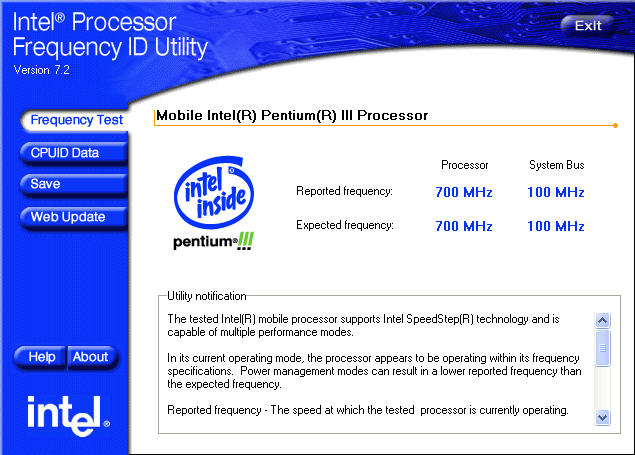
The products you are looking for are no longer manufactured by Intel. Additionally, Intel no longer provides interactive support for these products via telephone or e-mail, nor will Intel provide any future content updates or software updates to support new operating systems or improve compatibility with third party devices and software products.
THESE PRODUCT SUPPORT DOCUMENTS ARE PROVIDED FOR HISTORICAL REFERENCE ONLY AND ARE SUBJECT TO THE TERMS SET FORTH IN THE "TERMS OF USE" INFORMATION.
Information on currently available Intel products is available at www.intel.com and/or developer.intel.com
- General Information
-
- Component Packaging Information
-
Mobile Pentium® processors are available in the following packages: Plastic Pin Grid Array (PPGA), Staggered Pin Grid Array (SPGA), and Tape Carrier Packages (TCP).
The Intel Packaging Databook provides a comprehensive and in-depth analysis of Intel's packaging technology, including information on IC assembly, performance characteristics, and physical constants. There are also detailed discussions of surface mount technology and Intel shipping and packing.
Module Packaging Information
Mechanical dimensions are outlined in the Mechanical Requirement section of the following datasheets:- Intel® Pentium® processor with MMX™ technology Mobile Module datasheet
- Pentium Processor with MMX technology on .25 Micron Mobile Module datasheet
- Software and Drivers
-
- Download (Bootable Version) - Intel® Processor Frequency ID Utility
-
Version 7.2
The bootable version of the Intel® Processor Frequency ID Utility is available in .exe format. This download does not work in DOS-emulation windows, as found in operating systems such as Linux*. Since this version is bootable, it does not depend on any specific operating system (OS independent).
See the Installation Guide for detailed instructions on how to use this utility.
Which Utility Should I Use?
For Intel® Pentium® III processors, and processors manufactured before the Intel® Pentium® III processor, use the Intel® Processor Frequency ID Utility.
- Download (Windows* Version) - Intel® Processor Frequency Utility
-
Version 7.2

The utility is available for download in a self-installing .msi file format.
- Supported Processors
- Supported Operating Systems
You must have system administrative rights for successful installation on Windows XP* and Windows 2000*.Note There are two processor identification utilities used to identify Intel® processors. The Intel® Processor Identification Utility is the newest identification utility. Before downloading either utility, review the supported processors list to see the processors supported by each utility.
- Frequency Test Tab
-

The Frequency Test Tab can provide information regarding the operating status of the tested processor or system bus. It will report:- Proper Intel® processor brand identification
- Processor and system bus expected frequencies
- Processor and system bus reported frequencies
- Accompanying this information is a message informing the user whether the processor is operating at its expected frequency
- Which processor was tested in a multiprocessor system, and total number of processors (Windows* XP, and Windows* 2000 only)
- Intel® Processor Frequency ID Utility for Windows*
-
The CPUID Utility for Windows* is incorporated into the Intel® Processor Frequency ID Utility.
Use the CPUID Data Screen of the utility to identify Pentium® processors and higher.
- Supported operating systems for the Intel® Processor Frequency ID Utility
-
Operating System
- Windows 98* SE
- Windows 2000* Professional, Server, Advanced Server
- Windows Me*
- Windows XP*
Note Windows 95*, Windows 98, Windows NT* 3.51, and Windows NT 4.0 are no longer supported. Use bootable version of the Intel Processor Frequency ID Utility for systems which have Windows 95 or Windows NT 3.51 installed.
- Intel® Processor Identification Utility download for Windows*
-
This utility is designed to identify current Intel® Processors and technologies, and enables you to run and save a processor ID report. The utility also features a frequency test to make sure that the processor is working at the tested and rated speed.
The Intel® Processor Identification Utility video walks you through download to installation, and provides an overview of the most common technologies supported by the processor.
The latest version of Intel® Processor Identification Utility is available for download in a self-installing .msi file format.
Note Microsoft Windows XP* and Microsoft Windows 2000* users must have system administrator rights to install the utility.
- Technical Notes
-
- These products are no longer supported via phone, e-mail, or chat
-
The following older processor families are no longer supported through interactive support such as phone, e-mail, or chat.
Intel will maintain information for these processors on our web site.
Processor End of interactive support (EOIS) Additional description Mobile Intel® Pentium® 4 Processors - M November 8th, 2008 All Intel® Processor Frequency ID Utility November 8th, 2008 All Intel® Pentium® Processors Extreme Edition November 8th, 2008 All Intel® Pentium® D Processors November 8th, 2008 All Intel® Pentium® 4 Processors Extreme Edition November 8th, 2008 All Intel® Pentium® 4 Processors Extreme Edition supporting HT Technology November 8th, 2008 All Intel® Pentium® 4 Processors November 8th, 2008 All Intel® Celeron® D Processors November 8th, 2008 All Intel® Celeron® Processors November 8th, 2008 All 478-pin package December 1st, 2004 All FCPGA & FCPGA2 packages December 1st, 2004 All 370-pin package June 14th, 2002 All PPGA & SEPP packages Still supported [E3000, E1000 & 400 Series are still supported] Intel® Pentium® III Xeon® Processors December 1st, 2004 All Intel® Pentium® III Processors December 1st, 2004 All Mobile Intel® Pentium® III Processors December 1st, 2004 All Intel® Pentium® II Xeon® Processors June 14th, 2002 All Intel® Pentium® II Processors June 14th, 2002 All Mobile Intel® Pentium® II Processors December 1st, 2004 All Intel® Pentium® Pro Processors October 17th, 2000 All Intel® Pentium® Processors with MMX™ Technology October 17th, 2000 All Intel® Pentium® Processors October 17th, 2000 All Intel® Pentium® Mobile Processors October 17th, 2000 All Intel® OverDrive® Processors October 17th, 2000 All Intel486™ Processors December 1st, 2004 All Intel386™ Processors December 1st, 2004 All